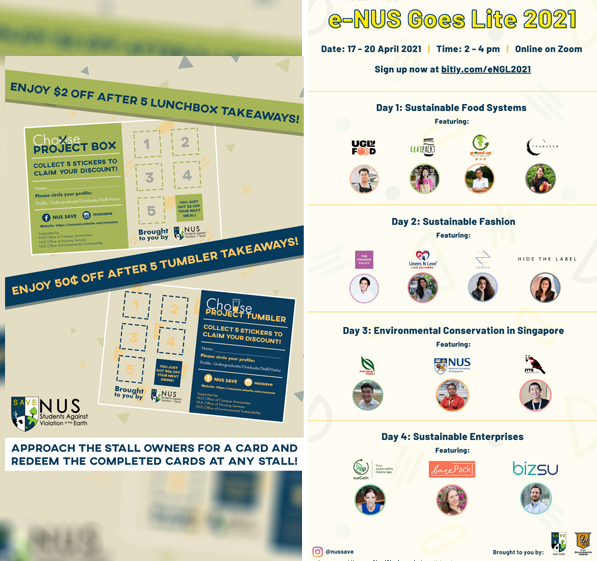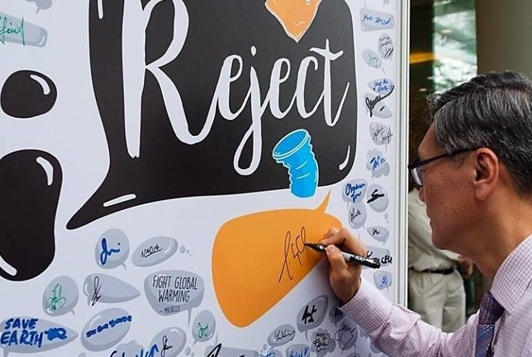
The power is yours
21 April 2021
22 April marks the anniversary of the birth of a modern environmental movement known as “Earth Day”.
Undoubtedly, climate change is a global issue. Singapore is implementing its sustainability drive under the umbrella of Singapore Green Plan 2030. In Budget 2021, the Singapore Government narrowed on three sectors for greater environmental focus - encouraging use of electronic vehicles, greater funding into food resilience and green financing for promoting a more sustainable economy.
Video courtesy of greenplan.gov.sg
Closer to home, NUS is ramping up its own green initiatives at the university and student organisation level in order to play a part in ensuring a more sustainable future. It would be befitting to take a look back at some of the collective green initiatives happening within the NUS community.
1. NUSPA’s Green Series
The NUS Students’ Political Association (NUSPA) green series is a student-led initiative that aims to engage with Singaporean youths to raise greater awareness on the nation’s green and sustainability goals and policies.
To accomplish this mission, NUSPA has set up the Green and Sustainable Singapore Taskforce (GSST) to collaborate with relevant government ministries and agencies, NGOs, and student societies to build a green ecosystem that fosters youth participation in eco-friendly issues.
In their most recent and memorable event, NUSPA spoke with Member of Parliament Mr Louis Ng to discuss Singapore's Green Plan as well as his own journey as an environmental activist in the parliament.
In the coming months, the GSST will launch survey exercises and exciting engagement activities for youths, so stay tuned for more updates!
Video courtesy of NUSPA: 10 Questions with Louis Ng
2. NUS Sustainability and Strategic Plan
NUS has been on track to build a sustainABLENUS for many years now. Spearheaded by the NUS Sustainability Steering Committee, the Sustainability Strategic Plan (2017-2020) mainly focused on the operational aspects of the university. The plan identified the university’s key environmental impact areas as well as outlined the goals and actions necessary to reach the set environmental targets by 2020.
These targets revolved around six key areas of focus: carbon emissions, energy, water, recycling, built environment and green spaces in buildings. The Sustainability Steering Committee is chaired by Professor Yong Kwet Yew, Senior Vice President (Campus Infrastructure) and is divided into five task forces in total:

Photo Courtesy of NUS Sustainability Steering Committee
Organised around the core areas of carbon emissions and natural resources, the plan detailed the broad goals under each focus area as well as the strategies to be put in action - serving as a roadmap of NUS’ green intentions.
You can learn more about the individual goals and strategies in this well-compiled report. Beyond this plan, there are other green targets still in works, such as the ‘zero-waste NUS by 2030’ and ‘NUS Green Bond’ to fund NUS’ Green Finance Framework.
3. NUS SAVE
NUS Students Against Violation of the Earth (SAVE) is made up of a group of passionate undergraduates who are invested in environmental affairs and leading eco-friendly campaigns. The student group strives to be a leading youth foundation that advocates for NUS to be an exemplary role model in sustainability matters.
Some of their key initiatives include the popular ‘NUS Goes Lite’, ‘Plastic Bag Tax’ scheme and the memorable ‘Project Box & Project Tumbler’ (PBPT).

Photo courtesy of NUS SAVE
In 2021, NUS SAVE organised their virtual flagship event, ‘NUS Goes Lite’ (NGL). The event took place from 17 April to 20 April, featuring prominent speakers from environmentally friendly businesses. Some of them include Chua Kai Ning, an eco entrepreneur from Insectta and Raye Padi, a sustainable fashion designer from The Fashion Pulpit. Participants were able to register for engaging discussions on topics ranging from sustainable food systems and fashion to conservation and enterprises.
- A Year Towards Zero Waste

Photo Courtesy of NUS OES
Every drop counts and this saying is apt for the multiple small campaigns that contributed to an eco-friendlier NUS and Singapore. NUS SAVE and the University administration have mobilised the student community to actively participate in innovative waste-reducing initiatives that helped chip in to 2019’s ‘Year Towards Zero Waste’. Some of these small campaigns include:
- Reusable Bag Library
- Going Straw Free
- Reducing Takeaway Disposables in Residences
These campaigns have been running throughout many of our undergraduate years, allowing us to witness both the genesis and evolution of these initiatives. For example, as many of us partook in NUS’ switch from plastic straws to paper/bamboo straws, we grew more conscious of the effects of different materials on our environment.
3 Easy Ways to Become a Greener Student
While these campaigns had played a huge role in contributing the gradual shifts in mindsets, students can work towards being more conscious with their daily consumption.
How can you play your part? Follow these three basic principles to live sustainably:
1. 3Rs –Reduce, Reuse, Recycle
Don’t forget this golden rule. Whenever in doubt, just apply the 3 Rs in your life.
Reduce consumption – buy more consciously.
Reuse your shopping bags, takeaway containers and bottles/tumblers when you make a purchase.
Recycle your old coffee glass jars, product containers and even clothes. Donate your old clothes to those in need.
2. Save Energy
How much electricity are you consuming daily? Are you meticulous in switching off all the electrical appliances after using them? How much water are you using, and could you use less of it? The simplest thing we could do is approach our parents and inquire about the electricity bills – and figure out where costs can be cut.
3. Cut down on plastic
There are some materials that have come under the spotlight for being bad for the environment, with the most common being plastic. Singapore uses close to 1.76 billion plastic items each year, with 900 million being discarded each year and only 4% being recycled.
We can reduce and reuse our plastic packaging - buying fewer plastic bottles, cutting down on plastic straws, recycling plastic for trash bags – and go more plastic-lite.
We can also contribute to the national initiatives of going ‘No Plastic’ by 2030 by doubling our plastic recycling, reducing unnecessary plastic consumption and shifting to more sustainable materials.
Make everyday earth day!

